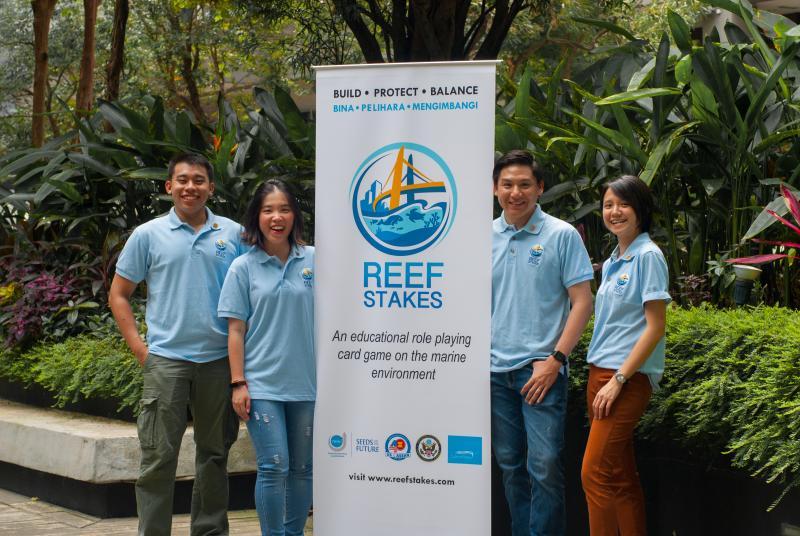Image

2021 EE 30 Under 30 Changemaker Grant Project
Reef Spawn: Broadcasting marine environmental education in Malaysia and beyond
Reef Spawn is a youth capacity development program brought to you by Reef Stakes®, the first marine-themed role-playing card game in Malaysia. Through four practitioner-led virtual sessions followed by a three-day, two-night hands-on bootcamp, Reef Spawn will equip 12 budding conservationists with the knowledge and skills necessary to contribute to the marine environment in Malaysia. The 12 selected participants are expected to broadcast the lessons learned and empower other youths in their communities to champion the marine environment.
**********
E 30 Under 30 Biography
Kuala Lumpur, Malaysia
Age: 27
Yew Aun shares his passion for education and the marine realm through Reef Stakes® - the first marine-themed role-playing card game in Malaysia.
Tell us about yourself!
I am the co-founder of the Reef Stakes® card game – the first marine themed role-playing card game in Malaysia. The game is designed to mimic real-life stakeholder relationships, introduce some of Malaysia’s most iconic marine species, and highlight threats to coral reefs.
As for my day job, I am a marine biologist by training but am currently in the Malaysian civil service working on biodiversity conservation policy. I have been involved in a variety environmental education and outreach programs, and was previously a Conservation Officer for the Malaysian Conservation Alliance for Tigers (MYCAT). I am also a regular columnist for MalayMail Online, writing specifically about environmental issues.

My interest in biodiversity first manifested as a love for the great outdoors. Although I grew up in the city, I was an active boy scout and would often go camping in the tropical rainforest. Aside from that, my personal experience with conducting outreach programs spurred me to think about more effective methods of delivering environmental education.
“Sir, the reason why you shouldn’t use styrofoam and plastic is that it does not biodegrade, affecting marine organisms and their food chain thus leading to an ecosystem imbalance.” This is an example of a standard outreach script. Because there is often much negativity and jargon attached to environmental messaging, people are easily turned off. In the past few years, I have been lucky enough to explore the gamification of basic environmental concepts through the Reef Stakes® card game, as my co-founders and I believe that games can be an effective medium for environmental education
What advice would you give to the next generation of leaders that are looking to bring about positive change in their communities through EE?
Positive change requires sacrifice. You must be willing to contribute time, money, and effort if you believe in a cause. And if you have an idea, pursue it, but seek out collaboration if you think you can’t do it alone. Often, we get too caught up with whether an idea is feasible or not, that it just remains an idea.
To make Reef Stakes® a reality, my team members met very often to discuss concepts and plan the development of the game. It was a grueling process, but seeing our efforts pay off made the sacrifices worth it in the end.

I am motivated by the efforts of people around me. As someone who has played the role of leader and team player in many projects, I truly believe in finding the right people to achieve a collective goal.
As for inspiration, if I could point to a single person, it would be Dr. Louisa Ponnampalam from MareCet Research Organisation. I met her in my teens, and it was a turning point in my decision to pursue a career in marine science and biodiversity conservation. She was very encouraging and gave me a realistic view of this career field. I am thankful that she still offers me great advice to this day, and am proud that she continues to make waves in marine mammal conservation in the region.
What pro-environmental behavior do you think would make a big impact if everyone in the world started doing it?
Minimalism. Earth has finite resources. With the rapid expansion of the human population, there is bound to be a strain on our environment, leading to problems such as pollution, water shortages, and deforestation. I believe that the simple act of consuming less and within one’s means can collectively reduce this strain.